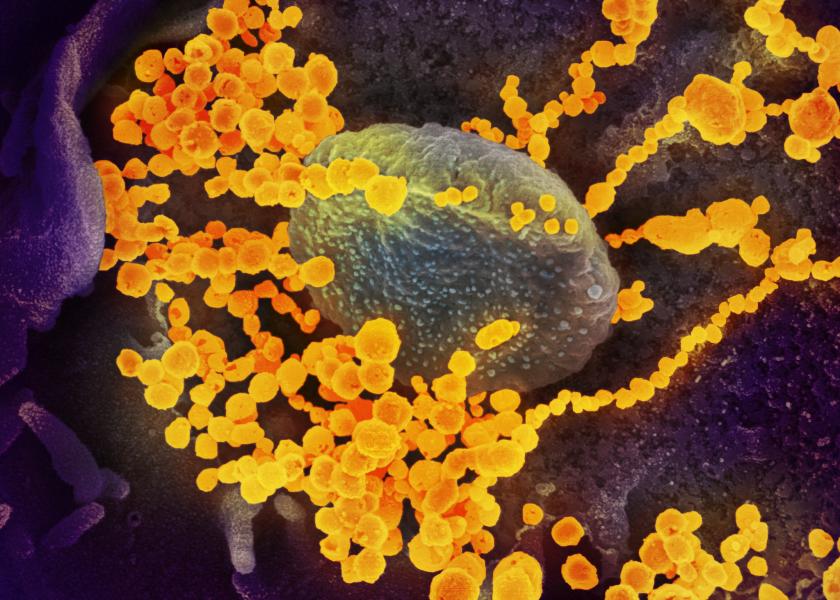Setting the Record Straight: Animal Ag Has Nothing to Do With COVID-19

By Hannah Thompson-Weeman, Animal Agriculture Alliance
While not surprising, it is infuriating to see various animal rights activist organizations attempt to take advantage of public fears surrounding the COVID-19 pandemic for their own gain. Activists with Direct Action Everywhere (DXE) are planning to trespass onto farms as part of their “Cancel Animal Ag” campaign claiming that animal agriculture is to blame for the coronavirus pandemic. Karner Blue Capital, an investment firm (where former HSUS CEO Wayne Pacelle is now an advisor), is calling attention to what they call “the link between infectious diseases like COVID-19 and the mistreatment of animals in order to highlight the health and economic consequences of these interactions.” Other groups like Mercy for Animals and Farm Sanctuary have written op-eds trying to say modern animal agriculture causes pandemics and public health issues.
The Alliance decided to call on some experts to help us set the record straight. It’s important to not let myths and rumors run rampant, especially at a time when people are looking for any way to keep their families safe. Here are a few questions I asked the experts and what they had to say.
Is there a connection between animal agriculture and the current COVID-19 pandemic?
Dan Thomson, DVM, PhD, chair of the Department of Animal Science at Iowa State University, pointed out that “no cow, pig or chicken has been found positive for COVID-19 in the world.”
Randy Singer, DVM, PhD, professor of epidemiology in the Department of Veterinary and Biomedical Sciences at the University of Minnesota, explained that “COVID-19 is believed to have possibly emerged through wild animals or a live market and then disseminated via a live market.” Singer went on to emphasize that “the past two large coronavirus epidemics (SARS 2004 and MERS 2012) likely originated from animals that have nothing to do with animal agriculture: wild animals for SARS 2004 and camels for MERS 2012.”
Richard Raymond, MD, former Undersecretary for Food Safety at the USDA, agreed, adding “there has been NO source identified for COVID-19 and there is certainly no link to food animals or animal production. Remember, it started in a multi-million population center in China, nowhere near any large food animal operations.”
Does eating meat (or other animal products) put people at risk of becoming infected?
All three experts solidly said NO. Raymond (the food safety guru!) explained, “eating meat might put one at risk of being infected with E coli or Salmonella if not properly handled and cooked to the right temperature, but COVID-19 is spread via the air, or aerosolized, not from eating anything, be it meat or veggies.”
Thomson pointed out that there it is possible that there is some risk of people spreading the disease by handling products and contaminating the packaging, but that has nothing to do with the product itself. “There is no greater risk for eating meat verses cereals, bread, vegetables, fruit or a candy bar,” Thomson said.
Does modern animal agriculture (for example, large scale farms) pose a greater risk for infectious disease outbreaks?
Despite the activists’ claims, the experts say this is not the case. “The modern housing used in animal agriculture actually protects the animals from infectious diseases that spread rapidly via wildlife spread, such as the movement of avian influenza by wild birds,” Singer said. “The high level of biosecurity used by modern animal agriculture has resulted in a greatly DECREASED risk of disease spread.”
Thomson added, “modern agriculture allows us to monitor animal health daily and quickly mitigate animal health issues.”
I hope this information is helpful in debunking the myths being spread by activist groups who just want to undermine public trust in animal agriculture. The experts all wanted to reassure the public that this is not something they should be afraid of. Thomson summed it up well and I’ll let him have the last word: “The USDA, FSIS and FDA are constantly monitoring the food supply chains to make sure we have safe, wholesome and nutritious food. We are proud of our farmers, ranchers and veterinarians on the frontline providing care and well-being for our animals.”
Hannah Thompson-Weeman is the vice president of communications at the Animal Agriculture Alliance. The opinions in this commentary are expressly those of the author. For more information on the Alliance, go to animalagalliance.org.
More from Farm Journal's PORK:
New Research Says Pigs, Chickens Are Not Susceptible to COVID-19
Pork Producers Face Harsh Reality of COVID-19
Pork Industry Prepares for Ripple Effects of Smithfield Plant Closing
Pork and Beef Plant Closures: Dynamic Disruptions Continue
USDA Confirms Highly Pathogenic H7N3 Avian Influenza in Turkey Flock







